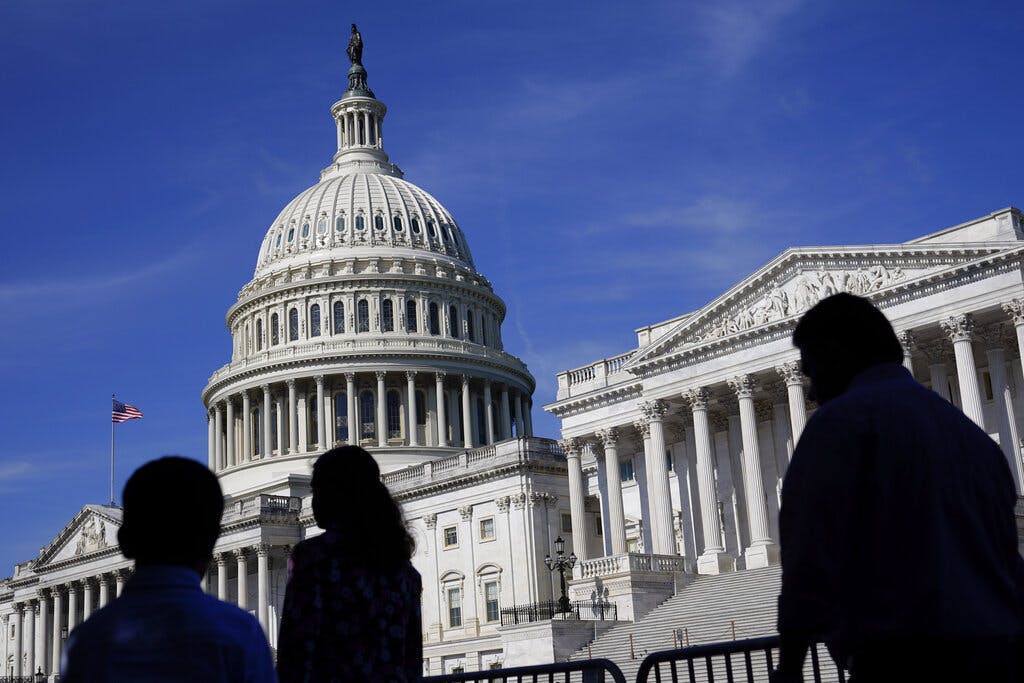Democrats’ Inflation Reduction Act Is Long on Promise, Short on Details
None of the bill’s supporters state exactly what impact the $370 billion in spending will have on global warming. Most can’t even explain how or by how much it will cut America’s greenhouse gas emissions.

The Democrats’ Inflation Reduction Act now wending its way through Congress will have practically zero impact on global warming despite costing taxpayers nearly $370 billion, according to a leading voice in the climate change debate.
The president of the Copenhagen Consensus Center, a Danish think tank focusing on the economics of climate change, Bjorn Lomborg, tells the Sun that the bill — aimed primarily at reducing the greenhouse gas emissions that contribute to global warming — will have only a negligible impact on the rate at which the earth is warming.
“The current bill will have very little climate impact,” Mr. Lomborg said. “Most people have no sense of how much needs to be cut in order to have an impact. Even if the entire U.S. went net-zero today and stayed net-zero for the rest of the century, it would reduce temperatures by just 0.3°F by the end of the century.”
The reason for that is simple, Mr. Lomborg said. Much of the problematic emissions for the remainder of this century are coming not from developed nations in North America and Europe, but from up-and-coming economies in Asia and Africa, especially China and India.
“They all want to be richer, which typically means more emissions,” he said.
Many scientists believe that a warming of the earth’s atmosphere by more than two degrees celsius in the coming decades could be catastrophic for the planet, and by some worst-case estimates the earth is on track to warm by as much as four degrees celsius by 2100.
To meet its international agreements, America has pledged to cut its greenhouse gas emissions in half by 2030. Currently, the country is on track to reduce its emissions by about 24 percent from the levels it generated in 2005. A co-sponsor of the Inflation Reduction Act, Senator Schumer, says it would boost that number to 40 percent over the next seven years.
The bill is aimed at achieving those goals through a grab bag of measures that its authors have touted as the “single biggest climate investment in U.S. history, by far.”
The bill allows for tens of billions of dollars in tax rebates, credits, and other incentives to get consumers to buy more so-called clean energy appliances and automobiles. There’s billions more to encourage companies to make solar panels and wind turbines and to invest in more climate-friendly factories. There’s $3 billion to pay for a fleet of electric vehicles for the U.S. Postal Service, and another $1 billion for clean school buses and garbage trucks.
Tucked into the measure is also $60 billion for “environmental justice” efforts in disadvantaged communities, $30 billion for “climate smart agricultural practices,” and $5 billion for forest conservation and urban tree planting.
In remarks championing the bill, President Biden called it a “huge step forward” and noted that climate leaders such as Vice President Gore have hailed it as a “necessary step to ensure the United States takes decisive action on the climate crisis.”
“This bill would be the most significant legislation in history to tackle the climate crisis and improve our energy security right away,” Mr. Biden said. “And it’ll give us a tool to meet the climate goals that are set — that we’ve agreed to — by cutting emissions and accelerating clean energy.”
At no point does Mr. Biden, or any of the bill’s other supporters, state exactly what impact all the spending will have on global warming, though. Mr. Lomborg said the bill’s supporters can’t even explain how or by how much its spending measures will cut emissions, much less reduce global warming.
“There is no detail to what cuts emissions and what doesn’t in the legislation,” he said. “I don’t think anyone has answered this yet.”
Mr. Lomborg argues that the only way to reduce emissions dramatically is through innovation in clean energy. The best way to do that, he said, is through investments in research and development of alternative energy sources instead of subsidizing technology such as electric vehicles that Americans would not be buying without government prodding.
“If we could innovate the price of green down below fossil fuels, everyone would switch,” he said. America should “bring forth innovations that reduce emissions and that many countries — including China, India, and Africa — will use.”
According to a fact sheet of the climate measures in the Inflation Reduction Act provided by its sponsors, the bill envisions channeling roughly $2 billion out of $370 billion to national laboratories to “accelerate” energy research.

